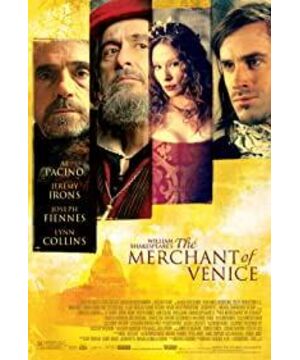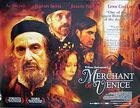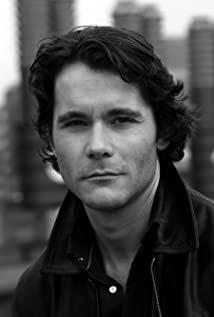First of all, the first shock point is the kiss of the two Neos, which is the kiss. Coupled with Antonio's affectionate eyes, I firmly believe that the two are definitely having an affair. When I was reading the Chinese script before, I just thought how could Antonio be such a buddy. But now I feel that this is not what friendship can do, and even when he is about to die, I just want to see Bassanio again, and it is not to blame him, but to hope that he remembers that he paid this debt with his life, and also wants Bassanio Neo told all this to his wife, and let her judge whether her husband had a real friend. Well, I think too much. At the end, Bassanio and Portia left, leaving Antonio in the hall alone, with that lonely look, like an abandoned horse. At this time, I automatically made up for his inexorable relationship with Sherlock.
Speaking of this Sherlock, Al Pacino really played him to the extreme. He is no longer the villain who is hated by people, but a pitiful, flesh-and-blood, oppressed, persecuted and finally lost everything and even his beliefs Man, maybe that's what Shakespeare meant. How should I put it, there are a lot of Shakespearean monologues in this film, sometimes it really makes people feel hypocritical, especially those of Portia, too contrived. And the monologue that makes me feel most comfortable is Al Pacino's monologue, which is naturally shocking and brought into Sherlock's world unknowingly. The way he looked around for calling on his daughter's rainy night in the city made me hate that eloquent Jessica a little bit. All in all, Al Pacino's acting is really impressive.
Let's talk about this Bassanio, I despise him from the bottom of my heart. Although he came from a noble family, he did not keep his wealth, he always relied on Antonio, and even borrowed the money to marry his wife, and then mortgaged his best friend to his enemy in order to marry a wife, a man who wanted his life all the time, And for a grand reason, friendship, sigh, with such a prodigal friend, Antonio, you should still follow Sherlock. Although he is a scumbag, he is also sincere. He only wants your life and has no wife. Then Bassanio brazenly took other people's money to marry the beautiful and rich Portia, but the tragedy is that Portia is still very smart, which helped him but also planted a ticking time bomb for their future relationship. . Then something happened to Antonio, and Bassanio took his wife's money to rescue his friend. Finally, he rescued his friend by relying on his wife. Completely empty-gloved white wolf, there is no way who can make people handsome? ! He swore to Portia that if the ring left his finger, then his life would cease to exist, and in a blink of an eye he handed the ring back because Antonio was saved, over and over again, whether Shakespeare was implying that all the oaths were untrustworthy Woolen cloth? I don't know if Portia can still live happily with such a man. I don't know if she will live in a kind of unease every day, otherwise she will ask Antonio to make sure that Bassanio swears. This is not happiness.
The whole movie scene gives me a renaissance oil painting feeling, everyone's face is soft, warm, a kind of unreal illusory. The background music is string music, using an instrument I know the name of, Qingyue but always with an inexplicable melancholy and sadness. So I always feel that this movie is not a comedy but a tragedy, and everyone is a tragedy. Antonio lost Bassanio, Sherlock lost his daughter, wealth and faith. Bassanio seems to be a big winner, but he broke his oath. Although Portia married the person he loved, but the lover shattered the oath that had not yet cooled, can we still trust in the future? endless torture. Jessica seems to have gained love and wealth, but she has betrayed her father who has never hurt her, and has never been forgiven in her life. How could she be happier in such a life.
Maybe real life is like this, no one is a big winner, no one can say that he is completely without fault. What we face is endless helplessness and harm to others, whether intentional or not.
View more about The Merchant of Venice reviews











